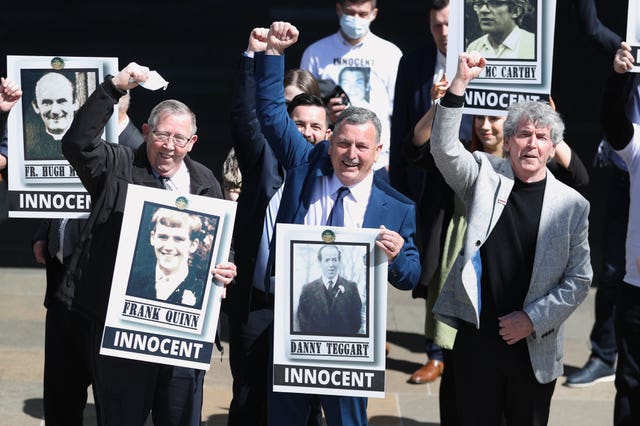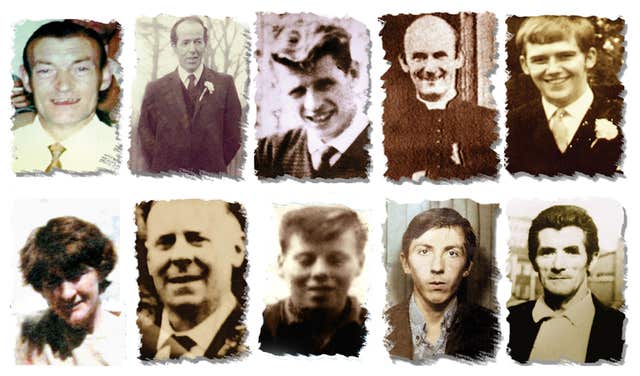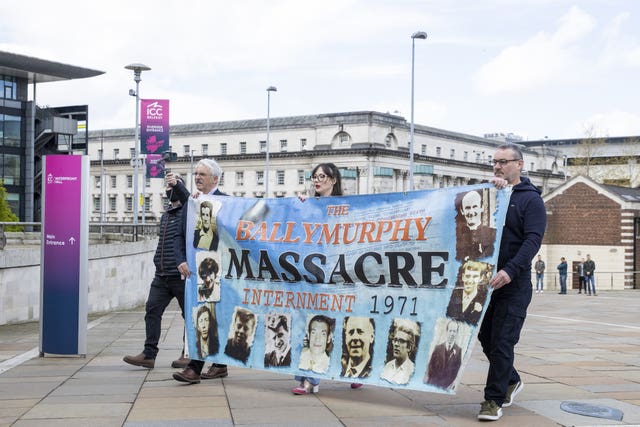Relatives of 10 people killed in west Belfast in shootings involving British soldiers 50 years ago have welcomed a ruling that their loved ones were “entirely innocent”.
There were jubilant scenes outside Belfast Coroner’s Court as the families of those shot in Ballymurphy in August 1971 emerged to cheers from supporters.
John Teggart, whose father Danny was among those killed, welcomed the “historic verdict”.
“After 50 years they have finally had their names cleared,” he said.
The daughter of Joseph Corr, another of those killed, said the inquest verdict had gone further than she had hoped.
Eileen McKeown said: “I was expecting them just to say they were innocent.
“But when she turned around and said that my daddy and John Laverty weren’t gunmen, and never should have been branded gunmen, that was really brilliant to hear that.
“We have fought long and hard for this, for 50 years, to declare my daddy an innocent man.”
Her sister Geraldine Douglas added: “The fight is won, big time.”

However, Sinn Fein president Mary Lou McDonald described the day as “bittersweet” with Prime Minister Boris Johnson promising legislation over the prosecution of former soldiers for incidents during Northern Ireland’s Troubles.
The Army has been found to be responsible for nine of the 10 deaths in August 1971, which included a mother-of-eight and a Catholic priest.
Presiding coroner Mrs Justice Keegan said there was not enough evidence for her to determine where the shot that killed the 10th victim, John McKerr, came from, but branded it “shocking” that there was no adequate investigation of the killing afterwards.
A solicitor who represents the Ballymurphy families said they have instigated civil proceedings against the Ministry of Defence.
“In light of these findings and the strong criticisms, they will be pushing on with that,” Padraig O Muirigh said.
Today, after 50 years, the families have been vindicated and facts have been laid bare before the world. The families always knew the truth and today it has been proven.
The British Government cannot block the families from getting justice. pic.twitter.com/pGbB1cTFh6
— Sinn Féin (@sinnfeinireland) May 11, 2021
Briege Voyle, daughter of victim Joan Connolly, called for the disbandment of the Parachute Regiment, describing it as a “disgrace”.
“They were not peacemakers, they were not brave soldiers.
“They were nothing but cowards.
“They shot my mummy, an unarmed mother of eight, from the safety of their barracks,” she said.
The coroner acknowledged it was a chaotic time in Northern Ireland but ruled that the use of force by soldiers had been “disproportionate” in the deaths the Army was found as responsible for.
The shootings started on August 9, hours after the controversial policy of internment without trial was introduced in Northern Ireland, when scores of arrests were made of IRA suspects.
Violence erupted across the region in reaction to the mass arrests.
Mrs Justice Keegan ruled out any paramilitary involvement by any of those killed in Ballymurphy, and described them as “entirely innocent of any wrongdoing on the day in question”.
There was applause within the courtroom as she made that pronouncement.
Ten fresh inquests were heard in terms of the five incidents in which they occurred.

Parish priest Father Hugh Mullan, 38, and Frank Quinn, 19, were shot in the Springfield Park area of Ballymurphy around 9pm on August 9.
The coroner found they were killed by shots fired by soldiers and that the force used was not justified.
Around the same time, outside an Army barracks at the Henry Taggart Hall in Divismore Park, Noel Phillips, 19, Joseph Murphy, 41, Mrs Connolly, 44, and Mr Teggart, 44, were fatally wounded by gunfire.
The coroner found these killings were not justified, and that the victims were “innocent” and unarmed.
“The Army had a duty to protect lives and minimise harm, and the use of force was clearly disproportionate,” she said.
The following day, Eddie Doherty, 31, died after being shot in the Whiterock Road as he came across an encounter between soldiers and protesters who had erected a barricade across the road.
The coroner ruled that the use of force in shooting Mr Doherty was disproportionate.
She also rejected claims that he had been throwing petrol bombs at the time.
“He was an innocent man who posed no threat,” she said.

In the fourth incident, on the third day of shooting, Mr Corr, 43, and John Laverty, 20, were shot in the Whiterock Road area in the early hours of the morning. Mr Corr died from his injuries 16 days later.
The coroner said the military had failed to establish an adequate justification for the use of lethal force in killing Mr Corr and Mr Laverty.
She concluded that the two men were shot by the British Army and there was no evidence that they could have been shot by anyone else. She also rejected claims that the pair were gunmen who had been firing at soldiers.
In the fifth incident, former soldier John McKerr, 49, was shot later that morning in Westrock Drive, close to Corpus Christi Church, as he took a break from maintenance work. He died of his injuries on August 20.
Mrs Justice Keegan said he was an entirely innocent man but there was not enough evidence for her to determine where the shot that killed him came from, or whether it was fired by the military or paramilitaries.
She noted that Mr McKerr was a “proud military man” and claims that he was associated with the IRA had caused great pain for his family in the five decades since.
“I can allay that rumour and suspicion once and for all,” she said.
The coroner described the inquests as the longest running to date in Northern Ireland.
While outlining the context in which the deaths happened, in terms of the start of what has become known as the Troubles and the introduction of the policy of internment without trial on August 9, she said she assessed each incident on its own facts.
The standard of proof used was on balance of probability.
She noted that, 50 years on, the deaths remain “stark” for the families.
Original inquests into the Ballymurphy deaths in 1972 returned open verdicts and the bereaved families subsequently pursued a long campaign for fresh probes to be held.
New inquests began in 2018, with the final oral evidence heard last March.




Comments: Our rules
We want our comments to be a lively and valuable part of our community - a place where readers can debate and engage with the most important local issues. The ability to comment on our stories is a privilege, not a right, however, and that privilege may be withdrawn if it is abused or misused.
Please report any comments that break our rules.
Read the rules here